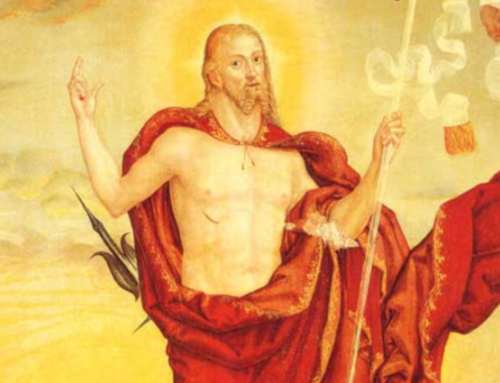 As the great Princeton classicist and Nation editor Paul Elmer More viewed it, the Great War (1914-1918) had descended upon the world as a punishment by the gods.
As the great Princeton classicist and Nation editor Paul Elmer More viewed it, the Great War (1914-1918) had descended upon the world as a punishment by the gods.
Nineteenth-century liberal man had forgotten how utterly flawed the human soul could be, and he had attempted to hide or destroy the temples and the so-called “superstition.”
“Now it used to be the belief of an ancient people, superstitious you may call them, yet one of the great promoters of civilization, that the invisible powers behind the things we see were wont to observe the thoughts and actions of mankind with watchful jealousy, and were particularly quick to avenge those who, from arrogance or folly, forgot, as the saying was, to ‘think as mortals,’” More wrote in early 1915. “Upon the minds of such men they sent a nemesis, in the form of madness and dazed bewilderment. Atê it was named. And to one listening today to the language of the press and the street it might almost seem as if the avenging gods were not dead.” Disaster has been brought upon the world, not by the sober minority of learned and civilized western men, More argued, but by “the ideologues who have had the ear of the multitude.”[1]
Since Karl Marx and Charles Darwin, then, culminating in Friedrich Nietzsche, the western world has been suspended between Manichean extremes, More believed: the traditionalist who finds meaning in the past and the ideologue who dreams of the future. Further, Marx had dismissed man as merely economic; Darwin as merely biological; and Nietzsche as nothing more than a waste of material.
Has there been real “progress,” More rhetorically asked? Did man really improve in the nineteenth-century? Did he better himself and his world? Did he perfect his soul, and grow out of his adolescent faith and superstition? No, More answered, resolutely. The attempt at progress only led regress and moral decadence. Even worse, such moral decadence had made an unholy alliance with technological prowess. “The imagination is excited by the devilishness of the new machinery of death, by the power of the long-range guns, the insidious terror of craft that smite inhumanly under the cover of water, and drop destruction from the clouds,” More wrote in 1915. “We have never known these things before, and it is almost as if we were in the position of a too cunning Frankenstein, shuddering at the demon he had created for his own ruin.”[2]
Though the English and French have no right to excuse themselves of such technological and “progressive” follies, the Germans had seemingly perfected Frankenstein’s monster. “Above all, it is in Germany that Socialism fattened and grew strong, and reared itself as the logical and organized enemy of economic and military competition,” More explained. There, as in many parts of England, France, and America, humanitarianism (a false or distorted form of Humanism and charity) had led to “the swelling reverence for the word “people” as expressing an idea opposed to the authority of character and education.”[3]
Such false teachings only exacerbated the poorest tendencies and vice-filled longings of man, to become puffed up with himself. “The preaching of an exaggerated humanitarianism rather inflames” the people and “renders them more efficient.”[4] The individual person becomes lost in a mass of conformity. This, More argued, becomes dangerous for two very important reasons. First, it dehumanizes the person by making him a mere cog in a vast machine. Second, it destroys that which makes us most human—our imagination and our ability to see beyond ourselves and the limits of our senses and reason.[5]
Wilson’s understanding and perversion of the imagination angered More more than anything else the president did or thought. Rather than use his liberal education properly, for the betterment of humanity, Woodrow Wilson used its forms, appealing to the imaginations of men, but changing its essence for his own perverted purposes. “I have disliked various politicians, Roosevelt for instance; but I have never felt towards any other man, not even Bryan, as I do towards Wilson. He has certain qualities which appeal to the intelligence of men otherwise clear-sighted and straightforward, and as a consequence he seems to have corrupted the nation at the top, and lowered our whole mental and moral tone,” More wrote in a letter dated February 25, 1917.
Only a year and one-half later, he again struck at Wilson.
Wilson’s sentimentalism was not a true ideal and was likely to be an important element in the horrible spread of Bolshevism that threatens the world. For a man in Wilson’s position to say, and insisted as one of the terms of peace, that all peoples have the right of determining their own government strikes me as nonsense, and perilous nonsense. It is impracticable, the sort of sentimentalism that does not conform with fact or utility yet may be the cause of endless confusion and anarchy. And this sort of thing underlies the whole Wilsonian brand of humanitarianism.[6]
In essence, Wilson had become nothing but a caricature of himself. Certainly he was a not a real man, according to More. He had failed his own soul, failed the citizens of the republic, and failed the world.
Whatever one might want to label him now, More refused to be either an “isolationist” or a “pacifist,” and, in his letters deposited at Princeton, he specifically attacked the pacifists for being little more than emotionally—driven ideologues. Instead, he believed there were just causes of war, though he knew all wars to “invert[ ] the order of nature,” causing “parents to inter their children.”[7]
Before charging into war, More had publicly warned Wilson in January 1915, a people must always do two things. First, a people must always set its “own house in order. Before the gate of the Paradise from which we have been ejected, are flaming swords of the two avenging angels, inexorable, whether we call them that nemesis of the gods or the law of nature.”[8] Second, every society must pursue “justice,” the end of all civil concord. “For justice is nothing but the balance within a man’s own soul, self-imposed and self-sustained, the will to know clearly the middle truth between the philosophy of egotism, which declares that it is for the strong and prudent to take whatever they desire, and the contrary philosophy of equalitarian sympathy.”[9]
More attacked American interventionism and Wilsonianism in several articles, and he continued that attack, though not as publicly, against FDR’s New Deal. More “mercilessly and unsmilingly exposed the fundamental inhumanity of the Nietzschean ‘Will to Power’ and the glorification of the Super-man, denouncing it as a Teutonic heresy that threatened the foundations of European civilization by trampling the Rule of Reason under the heels of brute force,” a colleague at Princeton remembered. Further, he was “critical of the vague and ‘expansive’ humanitarianism of the New Deal, not because he was insensitive to the plight of the impoverished or blind to the struggles of the under-privileged, but because he was suspicious of a democracy of the Heart that repudiated the aristocracy of the Intellect and while remembering the forgotten man, forgot the memorable man.”[10]
Books on the topic of this essay may be found in The Imaginative Conservative Bookstore. The Imaginative Conservative applies the principle of appreciation to the discussion of culture and politics—we approach dialogue with magnanimity rather than with mere civility. Will you help us remain a refreshing oasis in the increasingly contentious arena of modern discourse? Please consider donating now.
Notes:
[1] Paul Elmer More, “The Philosophy of War,” The Unpopular Review 3 (January-March 1915): 4-5; and More, “The Lust for Empire,” The Nation (October 22, 1914), 493-494.
[2] Paul Elmer More, “The Philosophy of War,” 5.
[3] Paul Elmer More, “The Philosophy of War,” 8.
[4] Paul Elmer More, “The Philosophy of War,” 13.
[5] More, Aristocracy and Justice (Boston: Houghton Mifflin), 151-89.
[6] Both letters quoted in Arthur Hazard Dakin, Paul Elmer More (Princeton, N.J.: Princeton University Press, 1960), 166-67.
[7] Paul Elmer More, “The Philosophy of War,” 11.
[8] Paul Elmer More, “The Philosophy of War,” 14.
[9]Paul Elmer More, “The Philosophy of War,” 15-16.
[10] J. Duncan Spaeth, “Conversations with More,” Sewanee Review 51 (Autumn 1943): 540-41.







Thank you, Brad, for raising the vision of an important imaginative and conservative mind. Like Irving Babbitt, P. E. More was a great advocate for moral leadership, for what we used to call a "natural aristocracy." His bitter remarks about President Wilson seem to come largely from a profound disappointment in Wilson's inability to recognize the importance of his elite political position and its accompanying responsibilities. Quoting Burke on aristocratic leadership, More believed that, to stanch the "vulgarizing ambitions" always threatening civilization, leaders needed to "stand upon such elevated ground as to be enabled to take a large view of the widespread and infinitely diversified combinations of men and affairs in a large society." More singled out Wilson for his criticism, but it is clear from the quotations above that More was not optimistic that many politicians' could grasp this, much less make it an integral part of their worldview.
As I read thinkers like More and Babbitt, I wonder, is there a place for them in the right-wing populism that represents the conservative movement today? So much of the conservative criticism of Washington seems to be an attack on the leadership class as an elite class, and not on the quality of that class. Yet More was not rejecting Wilson as an elitist, but was rather rejecting the poor quality of his leadership.
Throughout much of his writings, More addressed the nature of good leadership, much of it summed up in his two most cited essays, "Natural Aristocracy" and "Academic Leadership" [Shelburne Essays, Vol. IX]. Like the early Federalists, he feared the crowd culture and believed that progress could be attained, not through the rise of the masses, but through the just and humane leadership of the few. (It must be stated that More did reject an aristocracy based on wealth and inheritance.) As he stated rather bluntly, "an academic aristocracy must by its very nature be exceedingly jealous of any levelling process which would shape education to the needs of the intellectual proletariat and so diminish its own ranks. It cannot admit that, if education is once levelled downwards, the whole body of men will of themselves gradually raise the level to the higher range; for its creed declares that elevation must come from leadership rather than from self-motion of the mass."
I fear that we will be hard pressed to get the populist leaders of the Republican party or the "tea parties" to heed such language and still be successful at the polls. As More would ask, where are they who would "confirm the better judgment against the ephemeral and vulgarizing solicitations of the hour?"